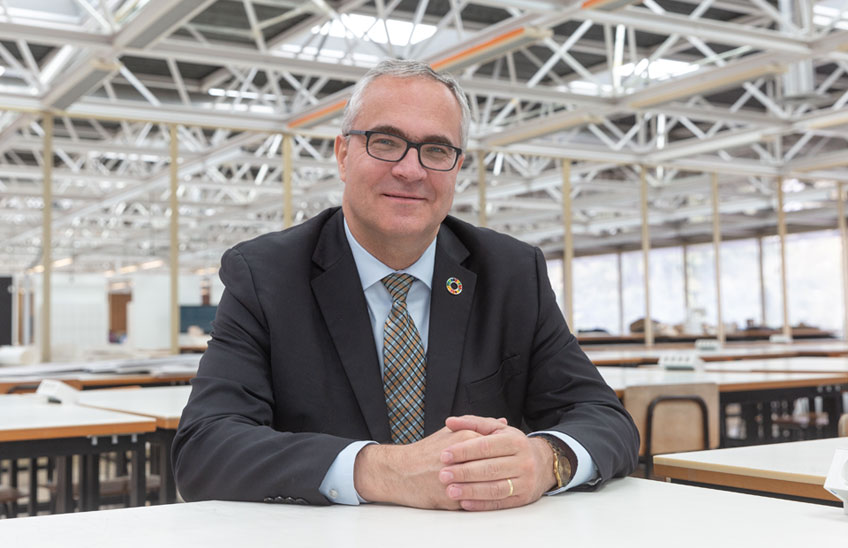"If we want to close the current housing gap we would need to build 96,000 affordable and accessible homes a day"
Michal Mlynár, director interim executive director of UN-Habitat, participated at the University of Navarra in the inauguration of 'Las ciudades y sus thesis ', a exhibition on the urban development of 9 Spanish cities.

FotoManuelCastells
/Michal Mlynár, director interim executive director of UN-Habitat, participated in the opening of the exhibition 'Cities and their thesis ' at the University of Navarra.
17 | 04 | 2024
"At least 50% of the world's population lives in cities, a figure that will increase to 70% or more," Michal Mlynár, director interim executive officer of UN-Habitat. The expert spoke about the housing crisis and pointed out that 3 billion people, about 40% of the world's population, are affected by it. "Closing the current gap would require building 96,000 new affordable and accessible housing units per day," he stressed.
This would not be realistic, he said, "but this figure sample is the problem for political leaders. On the other hand, he stressed that housing is an especially important topic for young people, "who cannot plan their careers, opportunities and family life without viable access to affordable and adequate housing."
Michal Mlynár visited the University of Navarra on the occasion of the inauguration of the inauguration of the exhibition 'Las ciudades y sus thesis ' at the Escuela Técnica Superior de Arquitectura. at the School of Architecture. lecture Mlynár gave a presentation on the role of academia in the implementation of the diary Urban and presented the Habitat UNI initiative, a program that seeks to promote cooperation between UN-Habitat and the university world. Currently, they have worked with more than 200 educational centers. "We need universities to prepare the future leaders and experts who will design cities and who will ensure that planning is done with sustainable, efficient and inclusive solutions," said UN-Habitat's acting executive director .
He also explained that academics have a panoramic picture of the challenges, opportunities and trends, which they then transform into solutions for society: "Universities have a special responsibility, being thought leaders and pioneers in innovation and technology," he said. At the same time, he pointed out that the institutions also serve as a support to collect accurate data that help research and the preparation of reports to make recommendations to governments.
The diary Spanish Urban
Michal Mlynàr described the diary Urbana in Spain as "fascinating", being one of the few countries to have developed this planning since 2016: "The Spanish diary Urbana has had the transformative power to focus a lot of attention on the present and future of cities." He explained that UN-Habitat is working on guidelines to create smart cities focused on people, especially people with disabilities or from disadvantaged communities. Finally, he commented that the diary Urbana must involve the different levels of governance and ensure that the rest of the actors, such as universities, associations, architects' associations, among others, are committed to its implementation.
The exhibition 'The cities and their thesis ' is an itinerant sample that has already visited Architecture Schools such as Valencia, A Coruña, Madrid, Seville, San Sebastian and Zaragoza. It includes a series of panels showing the urban development of 9 Spanish cities (Madrid, Barcelona, Valencia, Seville, Zaragoza, Alicante, San Sebastian, Pamplona, Logroño and Bilbao), a chronology of all the thesis carried out in the different schools of architecture during the period from 1970 to 2020 and a representation of the 9 cities prepared by the 300,000 km/s studio.
Elena Lacilla, curator of the exhibition, has mentioned that initially 247 thesis about cities made in different schools of architecture in the country in the period between 1970 and 2020 were identified. Of all of them, 70 were exhibited in a first sample in Valencia in March 2023. "All this research collects the knowledge of how our cities have evolved until today and is a very valuable material to keep in mind when thinking about the future development of our cities and urban areas," he says.




